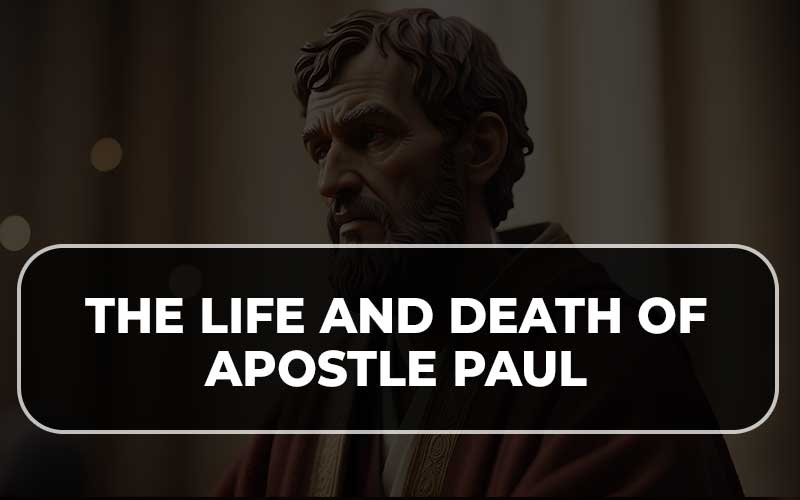The life of Apostle Paul is a testament to the transformative power of faith and the unwavering commitment to spreading the message of Christianity.
From his early days as a zealous persecutor of Christians to his conversion and subsequent missionary journeys, Paul’s life is a remarkable journey of redemption, courage, and sacrifice.
This essay delves into the life and death of Apostle Paul, highlighting his significant contributions to the early Christian church and the enduring legacy he left behind.
Life and Death of Apostle Paul
Early Life and Conversion of Saul:
Born as Saul of Tarsus in the first century AD, Paul grew up in a devout Jewish family. He was educated in Jerusalem under the renowned teacher Gamaliel, who was a member of the Pharisees.
With a fiery zeal for his Jewish faith, Saul persecuted the followers of Jesus Christ, believing them to be a threat to Judaism.
However, everything changed on the road to Damascus. While on a mission to arrest Christians, Saul experienced a blinding light and heard the voice of Jesus. This encounter led to his conversion and a profound change of heart.
Saul, now known as Paul, devoted himself entirely to spreading the teachings of Christ and became one of the most influential figures in the early Christian movement.
Missionary Journeys and Letters:
Paul embarked on a series of missionary journeys, venturing across the Roman Empire to share the gospel with both Jews and Gentiles. His travels took him to regions such as Asia Minor, Macedonia, Greece, and eventually Rome.
Despite facing numerous hardships, including persecution, imprisonment, and physical afflictions, Paul remained steadfast in his mission.
During his journeys, Paul established Christian communities, ordained leaders, and wrote letters to various churches, which later became part of the New Testament.
These letters, including Corinthians, Galatians, Ephesians, and Philippians, provided guidance, encouragement, and theological insights to these early Christian communities.
Paul’s Theological Contributions In Christianity:
Besides his missionary work, Paul made significant theological contributions that shaped the foundations of Christian doctrine. He emphasized the concept of salvation by grace through faith, emphasizing that one’s relationship with God is not based on adherence to the law but on faith in Christ.
Paul’s teachings also emphasized the unity of believers, regardless of their ethnic or social backgrounds.
Moreover, Paul’s writings explored profound theological concepts such as the role of Christ as the head of the church, the importance of love, and the hope of resurrection. His theological legacy continues to influence Christian theology and shapes the understanding of the faith to this day.
Imprisonment and Martyrdom:
Paul’s unwavering commitment to spreading the gospel eventually led to his imprisonment. While under house arrest in Rome, he continued to write letters and preach to those who visited him. Despite his confinement, Paul remained resolute in his faith and ministry.
It is believed that Paul was eventually martyred for his beliefs. While historical accounts vary, tradition holds that he was executed by beheading during the reign of Emperor Nero. Paul’s death marked the end of a remarkable life dedicated to serving God and spreading the message of Christ.
Legacy and Influence: The impact of Paul’s life and teachings cannot be overstated. His writings continue to inspire and guide Christians around the world. Paul’s emphasis on the transformative power of faith, the universality of God’s grace, and the unity of believers has left an indelible mark on Christianity.
Moreover, Paul’s missionary journeys laid the groundwork for the expansion of Christianity beyond its Jewish roots, making it accessible to people of diverse cultures and backgrounds. His tireless efforts to establish Christian communities contributed to the growth and resilience of the early church.
Conclusion: The Life and Death of Apostle Paul
The life and death of Apostle Paul are a remarkable testament to the power of faith, redemption, and perseverance. From his dramatic conversion on the road to Damascus to his missionary journeys and eventual martyrdom, Paul’s life exemplified unwavering commitment to spreading the message of Christ.
Paul’s writings and teachings continue to shape Christian theology and inspire believers to this day. His legacy serves as a reminder of the transformative power of faith and the enduring impact one person can have in advancing the cause of Christianity.
The life and death of Apostle Paul stand as a testament to the power of a life dedicated to serving God and spreading his word.
Also Read: How Did the Apostles die?

